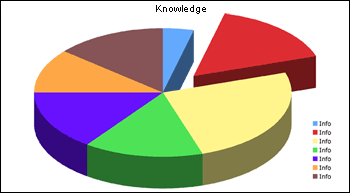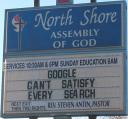Mercy and Web Permanence
By Prof. Ernest ThornberryAugust 15th, 2007
Dear Bunglehorn,
As you’re fully aware, the Enemy’s Church is founded on mercy, forgiveness and compassion. His entire mission on Earth is redemption (I say is, not was as his mission is unending.). He loves his creation so much, he gave his only son in exchange for their salvation.
You never want your patient exhibiting mercy, forgiveness or compassion. The more he conveys these “gifts” on others, the better he feels, and the harder he is to convert to our Father below. He actually becomes more Christ-like when he gives grace, just as the Enemy gave grace to him. Therefore, it is in our interest to prohibit love and grace. How?
Time and Healing
There is truth in clichés: Time heals all wounds, forgive and forget, out of sight, out of mind. It is not the Enemy’s intent for man to live amid pain and suffering. He is merciful, so his creation tends toward self-healing simply through the passage of time.
Therefore, we must stop time in order to stop natural healing. Believe it or not, man has finally entered an era where stopping time is quite possible. More on that in a moment.
First, we need to understand the impact of data and knowledge in the information age. Consider how the “speed of life” moves faster for man today than for his industrial and agrarian ancestors (we’ve discussed this before, see Theology of Unrest). Convenience and materialism compel people to fill their lives with stuff, they’re always on the GO GO GO! Yet healing and compassion are still slow. Why? Let me explain the connection between data storage and forgiveness.
Data Modeling 101
Data Begets Information
Data is the most basic element of knowledge. One piece of data may not be insightful. however, when combined with other pieces of data, information is formed. A cow’s runny nose may not raise concern for a dairy farmer, but combine this data point with lack of appetite, a dull coat and mucous eyes, he draws the conclusion that she’s sick.

Information Begets Knowledge.
Islands of information can feel disjointed and irrelevant. How much more useful is academic theory once it can be applied, observed, measured and studied?
If the dairy farmer knows a parasite is spreading throughout his herd, he is powerless to act without more information. He needs collective information on such matters as how to operate machinery, corralling methods, cattle medicine & vaccines, veterinary resources, etc. These pieces of information combined give him the knowledge needed to respond. Knowledge empowers man to act. His ability to properly diagnose a problem, plus his comprehension of treatment options, enables him to properly choose a course of action.

Man understands that the preservation of knowledge assists his natural fight for survival. In the spiritual battle between Good and Evil, we recognize that knowledge forms his intellect in order that people may freely choose the Enemy or reject the Enemy. If we can break the chain of knowledge, either with false data or wrong information, we harm his intellect.
With data playing such a critical role in the formation of knowledge, we naturally aim to skew it to our advantage. Obviously, we do this through subtly, deception and lies (changing data or misinterpreting information), but we can also add noise to skew results. We can inundate man with data to the point he cannot discern what is meaningful and what is useless. He’ll be inclined to save everything with the hope of parsing it later. Today, man’s finely-tuned capacity and desire to harness data sets him apart from his ancestors. It’s the beginning of a new era of knowledge transformation.
Data Modeling: Windows vs Google
Entire disciplines, technologies and industry have been borne out of the incessant need to store and retrieve massive amounts of data in a useful manner. Man’s initial design followed a folder/file motif (Windows) to the point of saturation. He’s storing so much information it’s becoming difficult to store, browse and retrieve data efficiently.
 As with anything good, he improvises by modeling nature. In this case a new search/find motif (Google) resembles his own brain in how it stores and relates data. Like his brain, where synapses or connections are strengthened by more use, search engine results are boosted by more queries and crosslinking.
As with anything good, he improvises by modeling nature. In this case a new search/find motif (Google) resembles his own brain in how it stores and relates data. Like his brain, where synapses or connections are strengthened by more use, search engine results are boosted by more queries and crosslinking.
Does the mind not weaken with age? Yes, because unused synapses in the brain weaken and lose or repress memory. With a lossy memory, he’s not inclined to retain our inhibitors of forgiveness like anger, frustration, anxiety and resentment. His brain is somewhat ordered toward forgiveness.
The Meaning of Time
If we can cause man to not forget, we’d buck the natural order toward forgiveness. By causing him to remember the injustices against him, in effect, we stop time. He’s stuck in a useful state of rage or fear or defensiveness.
This is not brain surgery (well, it kind of is, ha ha). The Enemy’s Church reveals the meaning of time through her cycles. The daily Liturgy of the Hours, the weekly call to Mass, the seasonal calendar are all ways man gets a glimpse of eternity with his creator. By participating in sacred worship structure, man joins his ancestors in the Universal Body of Christ in unending Sacred Tradition. This is why we love hearing people proclaim “I am spiritual, not religious.”
Theology of YouTube
In this missive, I’m suggesting that you and I turn the idea of remembrance inside out. That is, let’s call to mind the ugliness in life that once faded from memory, but now exists permanently in a global brain: the Internet.
As man is naturally ordered to forget, he is naturally ordered to forgive. Yet the obsession with storing data and information under the pretext of knowledge exposes an opportunity to subvert forgiveness. You’ll find this to be easy as the web becomes tightly integrated with culture.
The public Internet began with cataloging text and images from websites. The Wayback Machine archive yields all manner of regrettable statements that may originally have been offered under the delusion that the web is an erasable medium, or simply as an immature fool. Regardless, the ugliness is archived forever. And search engines ensure it is only a quick query away.
Like an infant’s brain, as the Internet’s physical network grows, it accommodates more realistic communication schemas like audio and video. We can strike on two fronts using visual stimuli (online video) as well as aural stimuli (hearing oneself read text). Both methods strengthen synapses for stronger memory. Eyes truly are the doors to their souls. Garbage in, garbage out. More truth in clichés.
 We’ve enjoyed television and film, but those were one-way conduits. Online video sites like YouTube enable true interactivity as it is produced by participants. The content is more personal to both producer and viewer, so each is more invested in the communication.
We’ve enjoyed television and film, but those were one-way conduits. Online video sites like YouTube enable true interactivity as it is produced by participants. The content is more personal to both producer and viewer, so each is more invested in the communication.
We are poised to attack. There is no precedent in history of this level of knowledge retention. Things said when people are young and foolish will come to haunt them. The most popular playback on video websites inevitably are the ugliness in life; crashes, selfish sexual behavior, humiliation and disrespect for authority. This is evident of our influence. Let’s continue to perpetuate unforgiveness.
This is antithetical to the Enemy’s plan. Since the fall in the Garden, people have broken their covenant with their Creator, yet he’s always forgiven them. Look to the rainbow after the flood. Moses leading the Israelites to the Promised Land. Christ instituted the sacraments so man may reconcile himself back to God when he sins. The Enemy wants everyone to heal his mystical body just as one’s own body heals after an injury. Mercy, borne from infinite love, is the essence of his relationship with man.
Therefore, we must show man no mercy. Steer your patient toward online videos of cruel pranks, humiliation, soft porn and plane crashes. Show pop stars falling off stage, politicians singing off key, teen angst and personal manifestos. Encourage him to judge the mistakes of others and to make rash comments in public forums. Let them see the ordinary faults of a fallen race and do not let them forget.
Warmest Regards,
Wigglebrick
5 Comments to “Mercy and Web Permanence”
Leave a Reply
You must be logged in to post a comment. Follow the rules »


I’ve always detested the rainbow as a sign of the Enemy’s mercy. I’m so glad we could finally usurp that enduring symbol and redefine it as one of misguided love and tolerance.
Lielack
August 15th, 2007 @ 3:19 PM
Caution: Forgiveness Alert
I like your plan, but what happens when everyone becomes more aware of their own mistakes when they see the faults of others?
Dumpster Breath
August 15th, 2007 @ 5:41 PM
@Dumpster Breath – I agree. Soon an entire generation may understand personal humiliation. In seeking forgiveness from others, they’ll be prone to forgive others. We must guard against this. Fortunately, it’s harder to forgive someone that does not regret their sin. If a person does not regret what they’ve done wrong, it’s harder to forgive them.
Slackjaw
August 16th, 2007 @ 9:04 AM
Essentially, we will need to confuse their ability to discern judgment. If web permanence ever leads to forgiveness, then we’d want them to forgive a little too easily (ergo without loving sincerity).
Stankonya
August 19th, 2007 @ 2:22 PM
If the Enemy knows everything, can the permanent storage of data lead man to join God’s omniprescence (all knowing) state? I’m thinking of Scripture references to man being made in the image of God and God being a part of man.
Noob Spook
August 21st, 2007 @ 1:45 PM